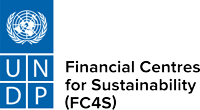Archives: Publications
Green and Sustainable Finance Cluster Germany – TCFD Think Tank Short Briefs
The Task Force on Climate-related Financial Disclosures (TCFD), led by industry, has drawn up recommendations for voluntary and consistent disclosure of climate-related information. Globally, the TCFD recommendations are now regarded as key guidelines. Numerous companies have committed themselves to their implementation. However, questions remain on their practical implementation.
In its TCFD think tank, the GSFCG seeks to answer those questions in cooperation with Frankfurt School of Finance & Management, PwC Germany, d-fine and right. based on science. Four workshops with selected practitioners from the financial sector helped to develop an in-depth understanding of the implementation of the TCFD recommendations.
The knowledge gained is now available to the interested public, in particular financial institutions, in the form of short briefs. They are tailored to practical needs show that new structures are needed, that a multi-level approach should be pursued and that expertise needs to be built up in specialist fields such as physical effects of the climate crisis.
Luxembourg Finance – Sustainable Finance
In recent years, financial markets have developed instruments that are specifically designed to raise money for sustainable development goals.Luxembourg has been at the forefront of this development, thanks to close cooperation between the public, private, and civil society sectors.The local sustainable finance ecosystem is furthermore stimulated by the presence of the European Investment Bank (EIB), the world’s largest lender, and an expert in public-private investment projects. The Luxembourg financial centre has built up an ecosystem that is uniquely suited to raising international capital for responsible investment.
Guernsey – Reporting Global Developments: Family Offices Financing Sustainability
High-profile protests and campaigns have not managed to significantly mobilise capital from the private wealth and family office sector into green and sustainable finance, according to research from Guernsey Finance.
The sector is increasingly important for attracting investment and although significantly more capital is finding a home in green investments, individuals and family offices appear to be looking for greater confidence in returns and in the green credentials of their investments.
The research, carried out with some 20 family offices and high net worth individuals, with a combined estimated worth of £25 billion, and 50 service providers, in 2019, showed more focus is needed in engagement with investment managers and investors on the aims of green and sustainable finance and the benefits of responsible investing.
Guernsey – Centre of Green and Sustainable Finance: A Jurisdictional Assessment
Using the framework developed by the UN Financial Centres for Sustainability (FC4S) Network, Guernsey Green Finance, Guernsey’s strategic initiative on green finance established by Guernsey Finance, has published a jurisdictional self-assessment of progress towards establishing itself as a leading global centre for green finance.
The report identifies that Guernsey has moved quickly, through the creation of Guernsey Green Finance, and has been able to exploit its connected institutional foundations to rapidly develop green and sustainable finance products and services, while working to promote and raise awareness of the cause among its finance sector community.
Portugal – Letter of Commitment to Sustainable Financing
This Letter of Commitment, voluntarily signed up to by its signatories, aims to contribute towards promoting and developing sustainable financing in Portugal, thus giving continuity to the work already done by the Think Tank.
Casablanca Finance City – Global Green Finance Leadership Program
International seminar on greening Africa’s financial system.
Guernsey – Green Private Equity Principles: A Guide to Best Practice for GPs
These principles provide a pragmatic and proportionate guide to best practice. They are structured as a two-pillar framework: firstly process, comprised of governance, culture and transparency; and secondly portfolio, covering risk assessment, assets, taxonomy, measurement, and reporting.
These principles are largely written from the perspective of the GP, primarily with a portfolio of majority owned direct investments, to help influence their investment process and policy as the stakeholder with the greatest degree of control over investments and the day-to-day operations. LPs and other relevant internal stakeholders may also identify with certain action points, and can also implement them into their everyday processes, where possible.
They are clearly voluntary – we have no desire to create more bureaucracy and burden. But they are created on the basis that firms and professionals will use them in good faith to guide and pivot their practices toward the goal of sustainability and fighting climate change.
Shifting Gears: How the world’s leading financial centres are entering a new phase of strategic action on green and sustainable finance.
This report, published by the Financial Centres for Sustainability (FC4S) Network, measures for the first time the contribution of financial centres to sustainable development and the ongoing low-carbon transition. It also identifies key challenges facing this growing sector.
In 2018, supported by EU EIT Climate-KIC the FC4S Network established an Assessment Programme to track the progress of financial centre efforts to support the expansion of green and sustainable finance markets, and explore different ways of measuring the contribution of financial centres to sustainable development and the low-carbon transition.
- Results of the pilot Assessment Programme survey illustrate that:
- New forms of public private partnership: Nearly two-thirds of financial centre initiatives on green and sustainable finance are partnerships between the private and public sectors, giving them unique ability to link policy and practice.
- There are material barriers to growth: The top three barriers faced by financial centres are i) a lack of green financial products, ii) inconsistent standards and iii) insufficient market demand. Lack of a shared language for green and sustainable finance is a key constraint, highlighting the need for continued dialogue between public and private stakeholders on taxonomies.
- Financial centres are going beyond climate: Climate change continues to be a major focus for activities branded as “sustainable” but FC4S members recognize need to broaden their offering to include other environmental priorities (e.g. circular economy, natural capital and conservation finance) as well as social themes, such as financial inclusion and social impact investing
- Policy innovation is a key driver: New policy initiatives and action by financial regulators and supervisors is a key driver in half the financial centres, with system-wide initiatives and debt capital markets the most cited examples. In a quarter of centres, policy and regulation is touching upon equity and debt capital markets, insurance, investment, banking and system-wide action.
- New instruments are proliferating: Over 75% of financial centres noted the presence of different debt instruments related to green and/or sustainable finance – primarily green bonds. Equity instruments are on the rise, with 25 % of respondents noting the presence of structured products, closed ended funds, and discretionary mandates.
- Progress varies across sectors: Investment and asset management is the most mature sector with respect to green and sustainable finance in most centres, while green banking is evolving, and insurance has the furthest to go.
- Professional services are growing rapidly: Over 75% of respondents acknowledged the presence of sustainable rating services and consulting firms; other services (sustainability research, labelling, legal, clean techs and carbon trading) are present in select financial centres.
- Shared priorities for Future Action: Leading financial centres have identified further product development, improved data collection and better market standards as top priorities for further development.
- Focus on Innovation: Applying financial technology (fintech) solutions to sustainable finance challenges is a major focus for financial centres, with several FC4S members establishing specific projects aimed at fostering innovation – including accelerator programmes.
- Increasing international collaboration: FC4S member centres are working more closely together on sustainable finance, including through bilateral projects. More and more centres are seeking to join the FC4S Network to benefit from collaboration opportunities.
Nigeria Sustainable Finance Roadmap
This report lays out the ways in which Nigeria can unlock the investment needed to move onto a more sustainable growth trajectory that will benefit its people, its environment and the economy. It provides an analysis of sustainable finance opportunities in Nigeria out to 2030, assesses the characteristics of these opportunities, and estimates current sustainable finance flows. Based on expert interviews, it also identifies barriers to scaling sustainable finance in Nigeria and lays out options to address them.










































